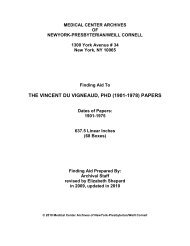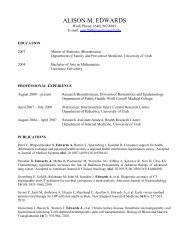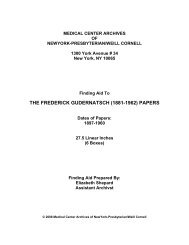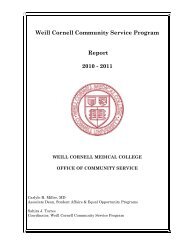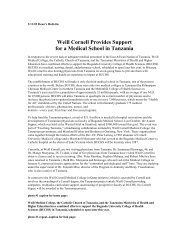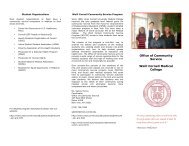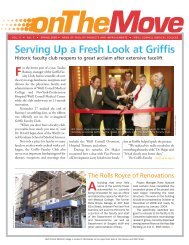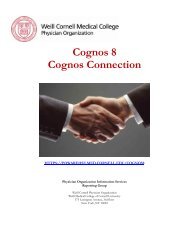Weillcornellmedicine - Weill Medical College - Cornell University
Weillcornellmedicine - Weill Medical College - Cornell University
Weillcornellmedicine - Weill Medical College - Cornell University
Create successful ePaper yourself
Turn your PDF publications into a flip-book with our unique Google optimized e-Paper software.
Around the campfire: Nighttime offers the<br />
chance to unwind and debate issues like<br />
the physician’s role in environmentalism.<br />
Camp Dudley is 270 miles from the Upper East Side, but<br />
in some ways it feels like another planet. The fresh air,<br />
the silence, the open space, the greenery, the blue<br />
water of Lake Champlain—it’s light years from the noise<br />
and bustle of Manhattan, not to mention the pressure of<br />
medical school. “In third year, you’re in the hospital all day and then<br />
you go to the library,” says Cynthia Santos ’10. “You don’t leave the little<br />
radius of the hospital. There are studies showing that medical students<br />
are so deprived of sun that they are vitamin D deficient—it gets<br />
that bad.”<br />
Getting time-crunched medical students and professors out of the<br />
city for a week is a fringe benefit of the wilderness medicine elective. In<br />
fact, one of the research projects being conducted by <strong>Weill</strong> <strong>Cornell</strong> professors<br />
Jay Lemery, MD, and Flavio Gaudio, MD, is on the protective<br />
effect of outdoor education on mental health, comparing <strong>Cornell</strong> freshman<br />
surveys to diagnostic codes in a double-blind study. (Their other<br />
projects include studying the use of water filters in an urban setting,<br />
such as a disaster where supplies are compromised, and establishing<br />
guidelines for the use of epinephrine to treat anaphylaxis in the back<br />
country.) “We always say that a huge part of what we’re doing is getting<br />
people out so they can see the link between the outdoors and health<br />
and wellness,” Lemery says. “Historically, doctors take care of themselves<br />
horribly. So that’s a big component of it, acknowledging that<br />
there’s a tremendous amount of stress, from being a medical student<br />
to a resident to an attending.”<br />
Todd Miner, director of <strong>Cornell</strong> Outdoor Education, cites Richard<br />
Louv’s book Last Child in the Woods, which describes a condition called<br />
“nature deficit disorder.” “Kids these days, who average thirty hours a<br />
week of screen time—whether that’s TV, computers, whatever—are not<br />
getting outside and exploring the woods,” he says. “Louv claims that<br />
everything from ADD to the rise in asthma and obesity can be at least<br />
partially traced to the fact that kids spend way too much time indoors.<br />
We would like to serve as an antidote to that and get people outdoors,<br />
Breath of Fresh Air<br />
Wilderness trips feed<br />
more than the mind<br />
connected to the environment—both for their own physical and mental<br />
health and also to provide the next generation of environmental<br />
leaders. Because if people don’t get out there, it’s a lot harder to get<br />
them to understand the role that the environment plays in our planet’s<br />
health.”<br />
On the last night of the wilderness medicine elective, the students<br />
and faculty sat around the campfire and had a philosophical discussion<br />
on the link between the environment and human health. “There has<br />
been a conspicuous absence of physicians chiming in on the environmental<br />
debate,” Lemery says. “My contention is that issues like global<br />
warming, population control, and resource competition affect human<br />
health. We talk about ‘save the Earth,’ and that’s important—but as<br />
physicians, there should be a bigger component, ‘save the humans.’<br />
Why aren’t physicians taking a lead role in environmental advocacy in<br />
the name of human health? In the next fifty years, environmental pressures<br />
are going to put huge stress on the human population. So to be<br />
a good environmental advocate is actually to be a good physician.”<br />
MINER<br />
WINTER 2008/09 25



